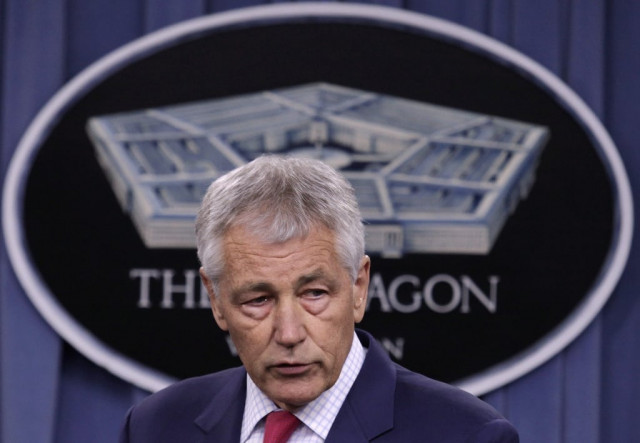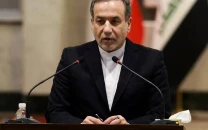US to deploy more interceptors to counter N Korea
The cost of the extra interceptors came to about $1 billion.

US Secretary of Defense Chuck Hagel speaks at his news conference at the Pentagon in Washington March 15, 2013. PHOTO: REUTERS
The new batteries will boost by almost half the 30 interceptors already deployed along the California and Alaska coastline and should be in place by 2017, as Pyongyang races to develop a nuclear-armed ballistic threat.
With North Korea having tested nuclear devices and launched a satellite, Hagel said the upgrade was designed to "stay ahead of the threat" as Kim Jong-Un's pariah state attempts to marry its bombs to its missile technology.
"The United States has missile defense systems in place to protect us from limited ICBM attacks," Hagel said.
"But North Korea in particular has recently made advances in its capabilities and is engaged in a series of irresponsible and reckless provocations."
Hagel cited the North's third nuclear test last month, the display of a suspected mobile intercontinental ballistic missile (ICBM) in April and the satellite launch as worrisome developments.
Apart from mobilizing the additional interceptors at Fort Greely, Alaska, Hagel also confirmed an announcement from last year that the United States plans to deploy a second advanced radar to Japan.
Hagel said the Pentagon was conducting environmental impact studies to clear the way for a possible additional American site for a ground-based missile interceptor, but no location has been chosen.
The US missile defense program has been plagued by technical problems, with the interceptors often failing in test launches, but Hagel said that "the American people should be assured that our interceptors are effective."
The technical glitches meant that more testing would be needed and the goal of deploying the interceptors by 2017 could be pushed back if the weapons failed to make the grade, said James Miller, undersecretary of defense for policy.
"We will continue to stick with our 'fly before we buy' approach," he told the same news conference.
The cost of the extra interceptors came to about $1 billion, he said.
North Korea has missiles that can strike South Korea and Japan but has yet to demonstrate it has the capability to fire long-range missiles that could reach the United States.
Officials worry, however, that the North has made progress on the ICBM front, having put a satellite into orbit, while Pyongyang's nuclear weapons program heightens concerns about the threat posed by the hermit nation.
Hagel stopped short of revealing Washington's estimate as to when North Korea could secure long-range missiles that could hit American soil, but he said the United States would leave nothing to chance.
"One of the reasons, again, we are doing what we're doing based on the intelligence we have is to assure that whatever their timelines are, that we're not reacting to those timelines, that we're ahead of any timelines of any potential threat," he said.
North Korea has issued a wave of drastic warnings in recent days and announced it has abandoned the 60-year-old armistice that ended the Korean War.
The North's military fired short-range missiles into the East Sea (Sea of Japan) on Friday, a day after Kim presided over a live-fire artillery drill near the disputed Yellow Sea border with South Korea.
Although the North's dire threats have been mostly viewed as bluster, the United States and its allies are worried Pyongyang is poised to stage some form of military provocation.
The United States retains a major military presence in the region, with naval ships equipped with anti-missile weaponry, 28,000 troops in South Korea and roughly 47,000 on the ground in Japan.
Officials said Washington had informed Japan, South Korea and China about the missile defense plans.


















COMMENTS
Comments are moderated and generally will be posted if they are on-topic and not abusive.
For more information, please see our Comments FAQ